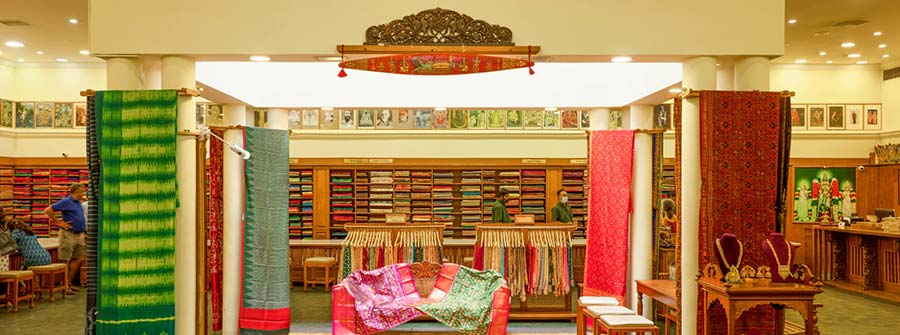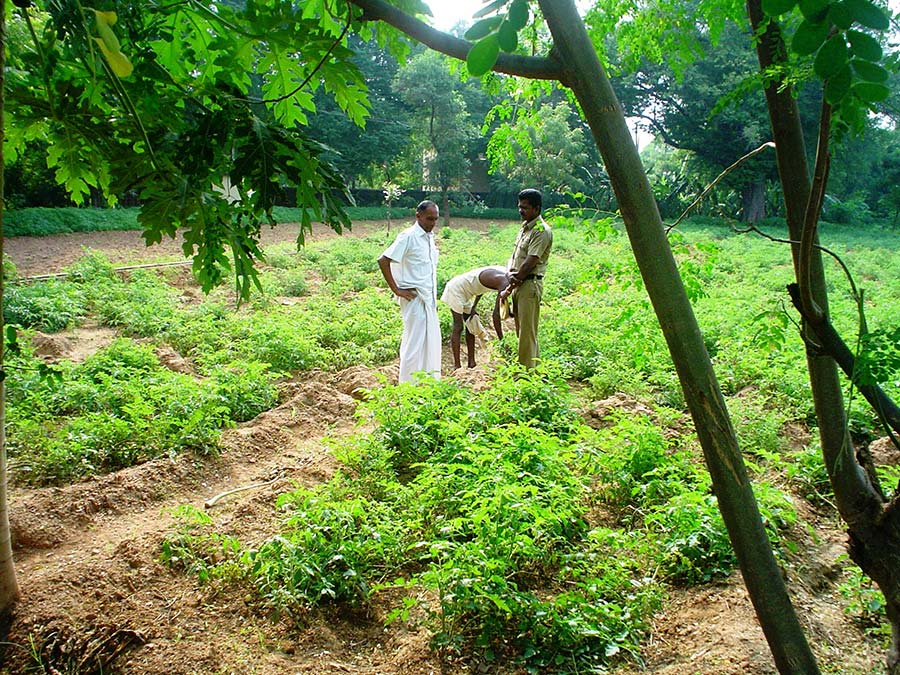The necklaces and chains are made of colorful beads and laid out neatly on white pieces of cloth. In the shade of a banyan tree or the pavement of a bus stand or on the temple steps, the Narikuravars sell their wares. Often ignored, many a time swatted away in annoyance, and sometimes avoided, this community is part of our urban landscape. From the depths of this marginalised community, a couple has faced and overcome challenges to give them dignity and respect by showcasing their innate skill of making beaded jewelry – Ladi Handcrafted Jewelry.

The Narikuravar community
You’ve seen them often enough by the temples, by bus stops, under trees and bridges. Though their appearance seems unkempt, the wares they sell speak volumes of their beauty, skill and design. From tiny glass manis to large and colorful beads, the jewelry of the semi-nomadic Narikuravars has been a part of our cityscapes and townships for generations. Having recently been granted ST status, the Narikuravars of Tamil Nadu have a rich cultural background and lineage that stretches from the deserts of Rajasthan, Gujarat, and the plains of Maharashtra. Southward migration of these gypsies created a unique language (called Vagriboli), unique customs, and even unique monikers. They are on the move every two to three weeks, setting camp to make and sell their wares, and then it’s onwards to the next encampment once again, for the next few weeks. Their art is passed down generations, their raw materials are procured from different states, and their customers range from temple devotees to Khadi stores. As with many of the anomalies that makes India so distinct, the Narikuravar community creates incredible and exquisite beadwork, but lives in squalor, deprived of even basic rights that we the citizens take for granted. Discrimination is rampant, they’re looked down upon, mistrusted and marginalised.
Before you think you stumbled upon a lesson in socio-economics, allow us to introduce two visionaries who are among the very few from this community that grabbed every opportunity to find their place in society. Meet Suvetha and Rajasekaran of Trichy. Their parents and ancestors are from subclans of the Narikuravar community, settled in the vicinity of Tirichirapally. Inspired by the work that both sets of parents have done for their community, the next generation has opted to continue their legacy of upliftment of their community.

Suvetha has an Engineering degree and Rajasekaran has an MBA. They’re from different cities, but discovered they had similar ideals once they were married. “My father used to run hostels for the boys and girls in our community,” says Suvetha proudly. “And Rajasekaran’s father was also involved in setting up schools for the children for their community in Perambalur, so we helped run these initially. Fifty to sixty children passed out successfully, being able to study from a stable place. They would go door-to-door to raise funds and faced a lot of challenges.”
Eventually, the couple found that many others were coming forward to help with education – private and public funds for basic schooling were slowly increasing. “What we learnt was that while education did find support, no one really cared about the lifestyle of our people. They had no proper housing or steady source of income,” says Rajasekaran. And that got them to segue into helping their people find a livelihood. Ladi was born.

The first bead
“I watched our people at bus stops and outside temples selling their wares. I would feel so bad and was desperate to do something for them. Initially, we attended seminars and spoke to various people to raise awareness, but there’s only so much an individual can do. How many chains can a kindhearted patron buy at the end of the day! I hated seeing them run behind people selling beautiful chains for Rs.10, and even that would be bargained down to Rs.5. ‘Akka akka, mani vaangungakka!’ was a constant refrain at these places,” says Suvetha sadly. “Picchai yedukkalai, avangaloda craft dhaan vikkeraanga. vyaabaram panraanga.” (“They’re not begging, they’re selling their wares, doing business.”) That got them thinking, and setting aside their professional training and ambitions, they decided to dive into a business venture – on behalf of their Makkal. The pretty bead work with its myriad intricate designs were worth far more than what they sold for. So, they decided to bring structure to the process and the sale too. “Our culture is unique, and our craftsmanship is exquisite, so why not use this to help them get appropriate returns for all their hard work?” asserts Suvetha. And so began Ladi, handcrafted beaded jewelry in 2023.
Ladi is today a small factory with a team of ten. “It’s a modest beginning, but the difference it has made to each of our team members is huge!” exclaims Suvetha. Today, the Narikuravar women of Ladi wear sarees that are their uniform; they work from the safety and comfort of their own space as opposed to being out in the open and struggling with social inequities and harassment that they’d resigned themselves to. They feel proud to belong and more so that their work is appreciated and brings them returns. The mad, mad world out there has ceased to be nomad-friendly. They’ve come to realise they need a roof and their children need education. That there is a stable, clean, healthy, decent world out there and they have the right to a life there. “This is the generation that should break the cycle of nomadic life,” says Suvetha.

Creating a chain
Rajasekaran explains, “Not that they’re going to get rich overnight, but at least they will not be undercut. They have someone they can trust to set fair prices and take their work to a bigger customer base. Of course, we couldn’t have done this ourselves. The government of Tamil Nadu has approved our grant, and we have recently received the transfer of funds too. The money is more like a loan, which we will repay in a few years; the government also stipulates how the funds should be allocated. Apart from the business itself, we have to make provision for their health, nutrition, and safe and clean working conditions too.”

Suvetha and Rajasekaran juggle a number of balls to ensure smooth working of Ladi. Suvetha takes care of day-to-day operations, sources raw materials, attends exhibitions and seminars to bring awareness to their cause, and of course manages the home front. Rajasekaran, on the other hand, works on setting prices and processes, liaisons with government officials, disburses funds, sets up and manages their e-commerce site. “The toughest part is actually convincing our people the worth of their own hard work! For generations, they have sold their wares for next to nothing, content with the few rupees they can take back home by evening. We have agents, who are also from our own community. These people sell the beaded jewelry in bulk to religious stores around temples for a commission. If you were to visit the Ayyappan temple in Trichy, every chain that any devotee wears is handmade by us. People know the difference between our malas and machine-made ones and always prefer our handiwork. But the agents are so scared of raising the price even by a rupee! Now that Ladi has begun making devotional beads, we set the price – basically an increase from Rs. 6 to Rs.20. Just convincing these agents is such an uphill task,” he sighs. But they do sell, and the shopkeepers don’t hesitate, because they know that every chain brings quality and culture with it.

Finding links
Ladi’s website showcases some very beautiful and intricate designs for their jewelry. The designs are contemporary and some follow the traditional patterns. All the credit for our designs goes to AICA or All India Artisans Crafts Welfare Association, New Delhi. When I went knocking on their door 2 years ago, they were so helpful and encouraging. I gave them a background of our Makkal and made a case for our skill and craftsmanship. I asked for help and a lady called Meenu Chopra gave us hope. Within one year she created a project – raised funds, guided us to collaborate with Titan, and connected us with many designers in Delhi, Mumbai, and Chennai. The designers provide the design sketches, and our artisans bring them to life. Whereas Titan gave us both the raw materials and designs, so our people created a whole new, exclusive line of handmade jewelry. AICA and Titan were so happy with our work. They said it’s a unique skill and has a great future,” gushes Suvetha.
Ladi is a social entrepreneurship, no doubt. It’s a company with a cause. To uplift the Narikuravar community and give them a stable livelihood and a social standing, hence. “To be honest, there are designs similar to these in the market. But it’s the skill we bring that makes all the difference. We have a cause, we have a story. This is not just another jewelry website. It’s the livelihood of each of these artisans. And it’s definitely different from sites like Flipkart or Amazon, since all our designs are handmade and bring a piece of our culture and a unique story of the artisan. It’s a story of empowerment,” says Suvetha enthusiastically.

Finding the ropes
Rajasekaran cautions, “We’ve only just begun, we have a long way to go. We are on social media platforms, and have an e-commerce site, which I maintain. We do not have a physical store, although we try to participate in craft fairs and put up pop-up stores in malls and exhibitions. We are 5 kms away from the freeway and can’t expect customers to drive all the way to Trichy to find us. We are not able to find the right channels to display our work. We’re in the growth stage, but it’s slow because of a lack of HR support. The government has been very supportive and has promised to extend the terms if we can scale.”
But this is one strong couple, and with a mission. Suvetha will not be cowed by these challenges. “I am very confident that once we reach our products to the right places, people will love them. They come like theni to a flower. That’s the quality we offer. Rajasekaran is the pillar of this company. He has a lot of patience, did all the ground work and laid the foundation for Ladi, he is the CEO and I am the COO. If we can get HR support, we can scale faster. That’s why we are on the lookout for volunteers or freelancers who will sell our products to a wider audience, even abroad.”

Online chain
Ladi jewelry is available exclusively through their e-commerce site. They sell what are called Spiritual Beads and contemporary designs. Their craftspeople work about 10 hours, with each chain taking up about 1.5 hours per worker. The work is tedious – the women do not use tools – even to cut the metal wires they use to string the beads on. Every step is done by hand. And until now they sold their work out on the roads and at temples and bus stands. Narikuravars were not even a recognized community, and do not belong to an organised sector – so they lack basic rights and facilities that every other community has. Hence, there are no organisations to set the standard for pricing. Added to this is of course the bane of the caste system and hierarchy. But the determination and resilience of this Narikuravar engineer and MBA brings hope and light. “We gave out salaries last month – the smiles and joy were a sight to see! For me to see another person’s joy is like an addiction. You want to do more and more to see that joy again and again,” laughs Suvetha. Rajasekaran smiles in agreement, but is more down-to-earth when he says, “It has taken us 4 years to bring Ladi Handicrafts to this stage. We don’t aspire to do big business, but to make a difference – even if 25 people benefit it’s great to start with. Our goal is to uplift our makkal to an extent that they can avail of benefits that the government provides. Just get them employment, and a dignified life.”
Ladi Handicrafts will appreciate anyone willing to offer marketing know-how and/or sales support. Anyone interested or ready to take this on as a project can contact Suvetha or Rajasekaran at: +91 96777 27817








